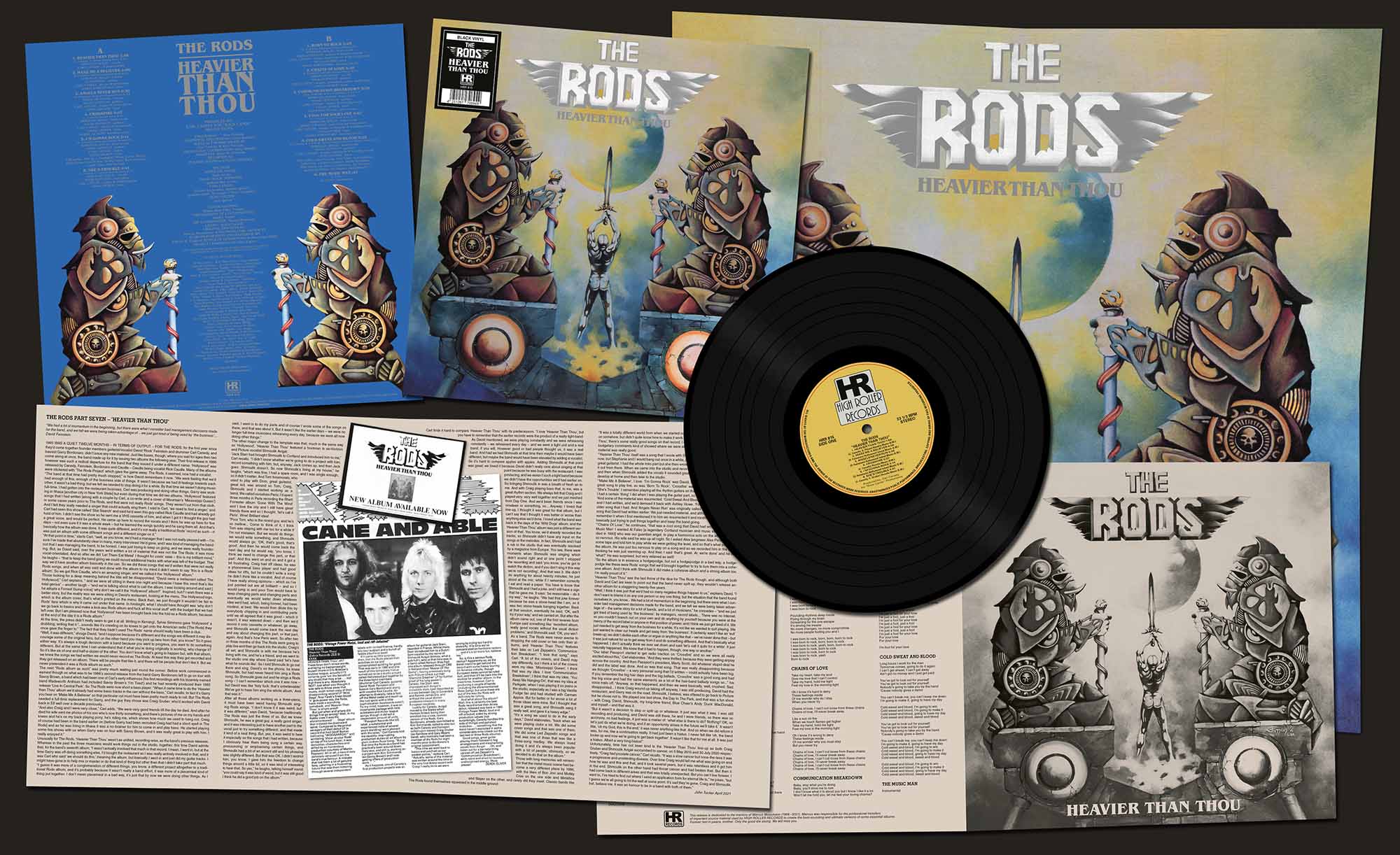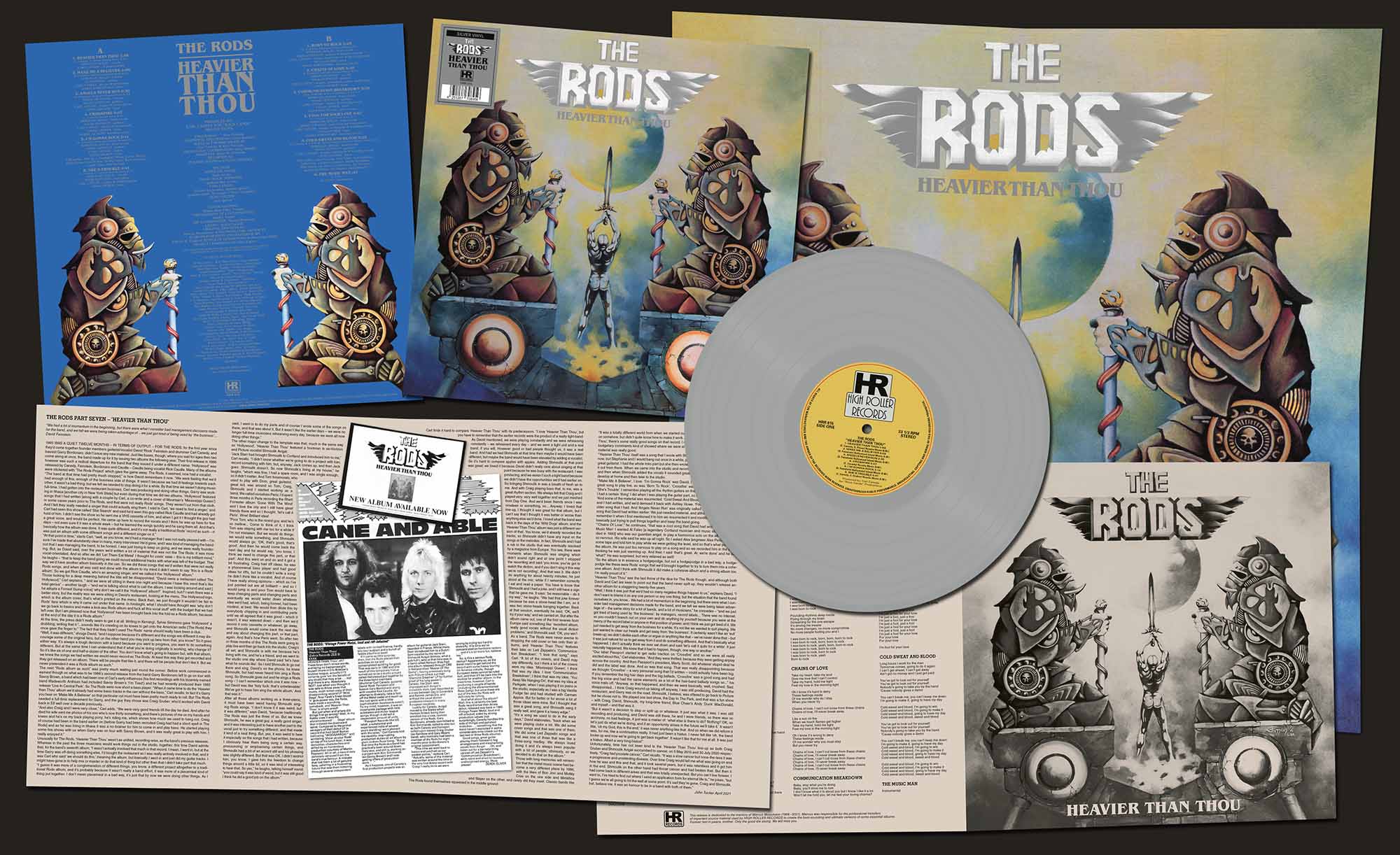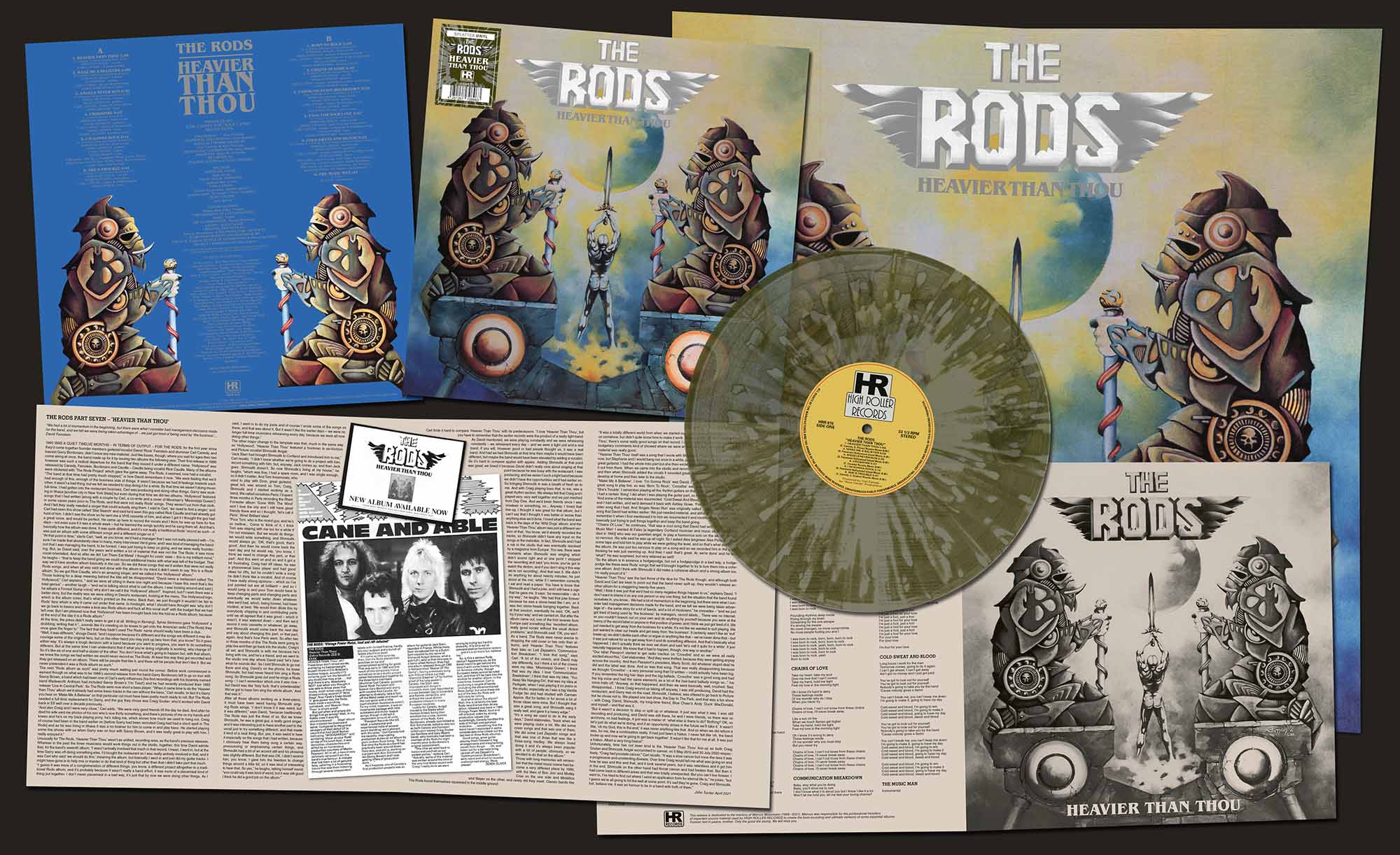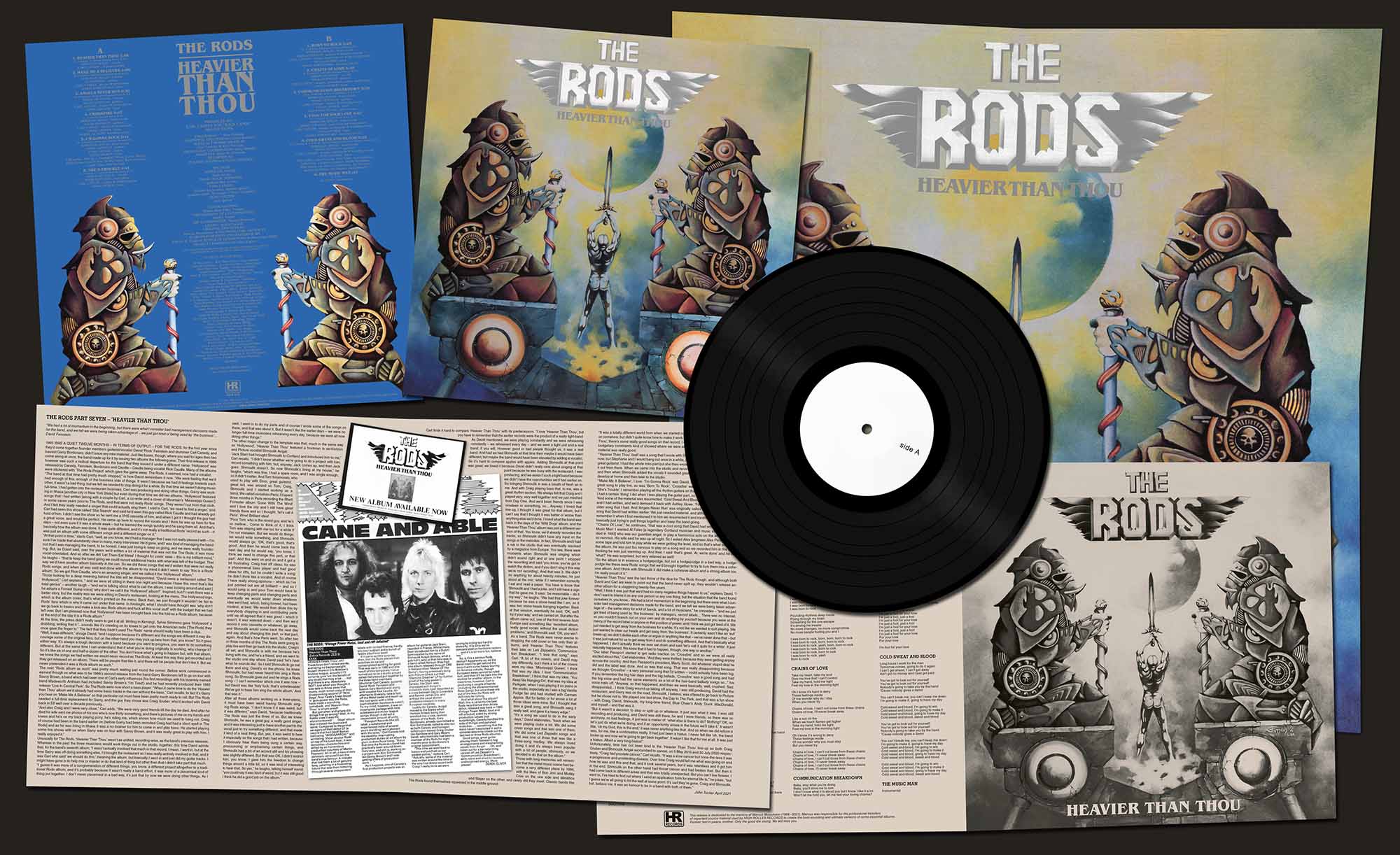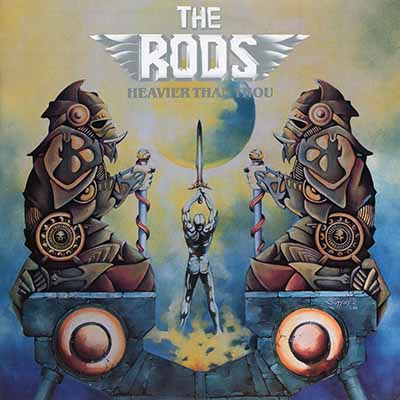 | ||||
| THE RODS - Heavier than Thou LP | |
HRR 815LP, ltd 600, 250 x black, 250 x silver + 100 x swamp green/ silver splatter vinyl (HRR mailorder exclusive), 425gsm heavy cardboard cover, 4 page insert, poster | |
| Shmoulik Avigal - lead vocals David "Rock" Feinstein - guitars and vocals Carl Canedy - drums, keyboards, rhythm guitar, guitars synth. and vocals "She's in Trouble" Craig Gruber - bass | |
| 01 Heavier Than Thou 02 Make Me a Believer 03 Angels Never Run 04 Crossfire 05 I'm Gonna Rock 06 She's in Trouble 07 Born to Rock 08 Chains of Love 09 Communication Breakdown 10 Fool for Your Love 11 Cold Sweat and Blood 12 The Music Man | |
AVAILABLE | |
Original transfer by Marcus Mossmann at PHONOGRAPHIC ARTIFACTS. Audio restoration and mastering by Patrick W. Engel at TEMPLE OF DISHARMONY in November 2020. Cutting by SST Germany on Neumann machines for optimal quality on all levels...
The ultimate audiophile reissue of this US Metal classic!
“We had a lot of momentum in the beginning, but there were what I consider bad management decisions made for the band, and we felt we were being taken advantage of... we just got tired of being used by ‘the business’... David Feinstein
1985 WAS A QUIET TWELVE MONTHS – IN TERMS OF OUTPUT – FOR THE RODS; for the first year since they’d come together founder members guitarist/vocalist David ‘Rock’ Feinstein and drummer Carl Canedy, and bassist Garry Bordonaro, didn’t issue any new material. Just like buses, though, where you wait for ages then two come along at once, the band made up for it by issuing two albums the following year. Their first release in 1986 however was such a radical departure for the band that they issued it under a different name: ‘Hollywood’ was released by Canedy, Feinstein, Bordonaro and Caudle – Caudle being vocalist Rick Caudle. Many of the albums were stickered with ‘The Rods Project’ which gave the game away. The Rods, it seemed, now had a vocalist.
“The band at that time had pretty much stopped,” is how David remembers it now. “We were feeling that we’d had enough of this, enough of the business side of things. It wasn’t because we had ill-feelings towards each other, it wasn’t a bad thing, but we felt we needed to stop doing it for a while. By that time we weren’t doing music full-time. I had gotten into the restaurant business, Carl was producing and doing other things, Garry was working in Ithaca [another city in New York State"> but even during that time we did two albums. ‘Hollywood’ featured songs that I had written [along with a couple by Carl, a co-write and a cover of Mountain’s ‘Mississippi Queen’"> in some cases years prior to The Rods, and that were not really Rods’ songs. They weren’t cut from that cloth. And I felt they really needed a singer that could actually sing them. I said to Carl, ‘we need to find a singer,’ and Carl had seen this show called ‘Star Search’ and said he’d seen this guy called Rick Caudle and had already got hold of him. I didn’t see the show so he sent me a VHS cassette of him, and when I got it I thought the guy had a great voice, and would be perfect. He came up here to record the vocals and I think he was up here for five days – not even sure if it was a whole week – but he learned the songs quickly and he sang them all. And that’s basically how the album was done. It was quite different, and it’s not really a traditional Rods’ record as such – it was just an album with some different songs and a different singer on it.”
“At that point in time,” starts Carl, “well, as you know, we’d had a manager that I was not really pleased with – I’m sure I’ve made that abundantly clear in many, many interviews! He’d gone, and I was kind of managing the band: not that I was managing the band, to be honest. I was just trying to keep us going, and we were really foundering. But, as David said, over the years we’d written a lot of material that was not like The Rods: it was more vocal-orientated. And so after we did ‘Let Them Eat Metal’ I thought for costs’ sake – this is my brilliant mind,” he laughs – “that to keep the band going we could record additional tracks with what was left of the budget. That way we’d have another album basically in the can. So we did these songs that we’d written that were not really Rods songs, and when all was said and done with the album to my mind it didn’t seem to say ‘this is a Rods’ album’. So we got Rick Caudle, who’s an amazing singer, and we called it the ‘Hollywood’ album.”
Those looking for a deep meaning behind the title will be disappointed. “David owns a restaurant called The Hollywood,” Carl explains, “ and we were all sitting in there one night and because I have this mind that’s like total genius” – another laugh – “and we’re talking about what to call the album, I was looking around and said [ he adopts a Forrest Gump voice"> ‘why don’t we call it the ‘Hollywood’ album?’ Inspired, huh? I wish there was a better story, but the reality was we were sitting in David’s restaurant, looking at the menu. The Hollywood logo, which is the album cover, that’s what’s printed on the menu. Back then, we just thought it wouldn’t be fair to Rods’ fans which is why it came out under that name. In hindsight, what I should have thought was ‘why don’t we go back to basics and make a kick-ass Rods album and fuck all this vocal stuff’ with the budget that we had left over. But I am pleased now that ‘Hollywood’ has been brought back into the fold as a Rods album, because at the end of the day it is a Rods album.”
At the time, the press didn’t really seem to get it at all. Writing in Kerrang!, Sylvie Simmons gave ‘Hollywood’ a drubbing, writing that it “...sounds like it’s crawling on its knees to get onto the American radio [The Rods"> they once gave the finger to.” The fact that they hadn’t used The Rods’ name should really have been a clue.
“Well, it was different,” shrugs David, “and I suppose because it’s different and the songs are different it may discourage some of the original fans, but on the other hand you may pick up fans from that, you know? So it goes either way. It’s always a tough decision with a band because you want to progress, you want to do something different. But at the same time I can understand that if what you’re doing originally is working, why change it? So it’s like six of one and half-a-dozen of the other. You don’t know what’s going to happen but, with that album, we knew the songs we had written we would never record as The Rods. At least this way they got recorded and they got released on an album. There will be people that like it, and there will be people that don’t like it. But we never pretended it was a Rods album as such.”
The next “Rods album as such” was pretty much waiting just round the corner. Before work commenced in earnest though on what was to be 1986’s second release from the band Garry Bordonaro left to go on tour with Savoy Brown, a band which had been one of Carl’s early influences (his first recordings with his bizarrely-named band Wadsworth Anthium had included Savoy Brown’s ‘I’m Tired’) and he had recently produced their 1985 release ‘Live In Central Park’. So The Rods were now short a bass player. “When it came time to do the ‘Heavier than Thou’ album we’d already had some basic tracks in the can without the bass,” Carl recalls. In fact it’s Garry you hear on ‘Make Me A Believer’ so that particular cut must have been pretty much ready to roll. But The Rods needed a full-time replacement for Garry, and the guy they chose was Craig Gruber, who’d worked with David back in Elf well over a decade previously...
“And also Craig and I were very close,” Carl adds. “We were very good friends till the day he died. And after he died his wife sent me photos of his son who’s now thirty-something, and there’s pictures of me on my hands and knees and he’s on my back playing pony, he’s riding me, which shows how much we used to hang out. Craig of course had been in the band earlier on [before Garry had been recruited Craig had had a short spell in The Rods"> and as he was living in Ithaca it was a no-brainer for him to come in and play bass. He started playing some live shows with us when Garry was on tour with Savoy Brown, and it was really great to play with him. I really enjoyed it.”
Unusually for The Rods, ‘Heavier Than Thou’ wasn’t as unified, recording-wise, as the band’s previous releases. Whereas in the past the three musicians would work things out in the studio, together, this time David admits that, for the band’s seventh album, “I wasn’t actually involved that much in that record. I mean, I went in, but at the time Garry was off doing something else, I’d bought the restaurant so I was really actively involved in that, and it was Carl who said ‘we should do this,’ meaning the album, but basically I went in and just did my guitar tracks. I might have gone in to help mix or master or do that kind of thing but other than that I didn’t take part that much.
“I guess it was more of a conglomeration of different things, you know, a different project altogether to a traditional Rods album, and it’s probably because it wasn’t really a band effort, it was more of a piecemeal kind of thing put together. I don’t mean piecemeal in a bad way, it’s just that by now we were doing other things. As I said, I went in to do my parts and of course I wrote some of the songs on there, and that was about it. But it wasn’t like the earlier days – we were no longer full-time musicians rehearsing every day, because we were all now doing other things.”
The other major change to the template was that, much in the same way as ‘Hollywood’, ‘Heavier Than Thou’ featured a frontman in ex-Horizon and Picture vocalist Shmoulik Avigal.
“Jack Starr had brought Shmoulik to Cortland and introduced him to me,” Carl recalls. “I didn’t know whether we’re going to do a project with him, record something with him, but, anyway, Jack comes up, and then Jack goes. Shmoulik doesn’t. So now Shmoulik’s living at my house,” he laughs, “which was fine; I had a spare room, and I was single enough, so it didn’t matter. And Tom Innamorato, who used to play with Doro, great guitarist, great kid, was around so Tom, Craig, Shmoulik and I started working as a band. We called ourselves Paris; I’d spent three months in Paris recording the Rhett Forrester album ‘Gone With The Wind’ and I love the city and I still have great friends there and so I thought, ‘let’s call it Paris’. Wow! Brilliant idea!
“Poor Tom, who is the nicest guy, and he’s so mellow... Come to think of it, I think Tom was staying with me too for a while if I’m not mistaken. But we would do things, we would write something, and Shmoulik would always go, ‘OK, that’s good, that’s good’. And then he would come back the next day and he would say, ‘you know, I think we need to change this part, or that part’. And this went on and on and it got a bit frustrating. Craig had riff ideas, he was a phenomenal bass player and had good ideas for riffs, but he couldn’t write a song: he didn’t think like a vocalist. And of course I have really strong opinions – which as I’ve just pointed out are all brilliant! – and so I would jump in and poor Tom would have to keep changing parts and changing parts and eventually we would water down whatever idea we’d had, which, being honest, had been modest, at best. We would then dilute this by everybody chipping in and contributing parts until we all agreed that it was good – which it wasn’t, it was watered down – and then we’d record it onto cassette or whatever, go away, and Shmoulik would come back the next day and say about changing this part, or that part, again. And that’s how Paris went. So after two or three months of this The Rods were going to play live and then go back into the studio. Craig’s all set, and Shmoulik is with me because he’s living with me, and he’s a friend, and we went to the studio one day where David said ‘let’s hear what he sounds like’. So I told Shmoulik to go out there and sing. David’s on the phone; he knew Shmoulik, but had never heard him sing a Rods song. So Shmoulik goes out and he sings a Rods song – I can’t remember which one it was now – but David was like ‘holy fuck: that’s unbelievable! We’ve got to have him sing the whole album.’ And that was it.”
After all those albums working as a three-piece, it must have been weird having Shmoulik singing Rods songs. “I don’t know if it was weird, but it was different,” says David, “because traditionally The Rods was just the three of us. But we knew Shmoulik, he was a great guy, a really good singer, and it was interesting just to have another part to the vocal just to try something different, and that made it kind of a neat thing. But, yes, it was weird to hear it especially on the songs that I had written, because I obviously hear them being sung a certain way, pronouncing or emphasising certain things, and Shmoulik had a bit of an accent still and his phrasing was slightly different. But that was OK. I didn’t restrict him, you know, I gave him the freedom to change things around a little bit, so it was kind of interesting to hear that. So yes,” he laughs, talking himself round, “you could say it was kind of weird, but it was still good: I think he did a good job on the album.”
Carl finds it hard to compare ‘Heavier Than Thou’ with its predecessors. “I love ‘Heavier Than Thou’, but you have to remember that the earlier records were the product of a really tight band. As David mentioned, we were playing constantly and we were rehearsing constantly – we rehearsed every day – and we were a tight unit and a real band, if you will. However good or bad people thought us, it was a real band. And had we had Shmoulik at that time then maybe it would have been different, but maybe the band would have been elevated by adding a vocalist. So it’s hard to compare apples with apples. Adding Shmoulik at that point was great; we loved it because David didn’t really care about singing at that point because he was busy with the restaurant, I was producing, and we weren’t such a tight band because we didn’t have the opportunities we’d had earlier on. So bringing Shmoulik in was a breath of fresh air to me. And with Craig playing bass that, to me, was a great rhythm section. We always felt that Craig and I played very, very well together and we just meshed from Day One. And we’d been friends since I was nineteen or something, so... Anyway, I loved that line-up, I thought it was great for that album, but I can’t say that I thought it was better or worse than anything else we’d done. I loved what the band was back in the days of the ‘Wild Dogs’ album, and the ‘Heavier Than Thou’ album was just a different version of that. You know, we’d already recorded the tracks, so Shmoulik didn’t have any input on the songs or the melodies. In fact, Shmoulik and I had a rub in the studio that was eventually resolved by a magazine from Europe. You see, there were moments when Shmoulik was singing which didn’t sound right and at one point I stopped the recording and said ‘you know, you’ve got to watch the diction, and if you don’t sing it this way we’re not recording’. And that was it. We didn’t do anything for about twenty minutes; he just stood at the mic, while if I remember correctly I sat and read a paper. You have to know that Shmoulik and I had a joke, and I still have a sign that he gave me. It says: ‘be reasonable – do it my way’,” he laughs. “We had that joke forever because he was a stone-head like I am, so it was two stone-heads banging together. Back at that session, eventually he said, ‘OK, we’ll try it your way,’ and we carried on. But after the album came out, one of the first reviews from Europe said something like: ‘excellent album, really good vocals without the usual diction problems,’ and Shmoulik said: ‘OK, you win’!
As a band, The Rods were never averse to dropping the odd cover or two onto their albums, and ‘Heavier Than Thou’ features their take on Led Zeppelin’s ‘Communication Breakdown’. “I love that song,” says Carl. “A lot of the covers, and David may say differently, but I think a lot of the covers were my idea. ‘Mississippi Queen’, I think that was my idea. I love ‘Communication Breakdown’; I think that was my idea, ‘You Keep Me Hanging On’, that was my idea at Parkgate, when I was playing it on piano in the studio, especially as I was a big Vanilla Fudge fan and had studied with Carmen Appice. But for better or for worse a lot of those ideas were mine. But I thought that was a great song, and Shmoulik sang it really well, and gave it a heavy edge.”
“It’s a song we used to do in the early days,” David elaborates, “back when we were playing clubs a lot. We did some cover songs and that was one of them. We did some Led Zeppelin songs and that was one of three that was like a three-song medley. We always loved doing it and it’s always been popular with a lot of people, obviously, so we decided to do that on the album.”
Those with long memories will remember that the metal music scene had become a very different place by 1986, with the likes of Bon Jovi and Motlëy Crüe on the one side and Metallica and Slayer on the other, and rarely did they meet. Classic bands like The Rods found themselves squeezed in the middle ground.
“It was a totally different world from when we started out,” Carl agrees. “I wanted us to carry on somehow, but didn’t quite know how to make it work. Where did we fit? But ‘Heavier Than Thou’, there’s some really good songs on that record. I don’t know if we recorded it well, the budgetary constraints kind of showed where we were at that time, but I thought some of the material was really good.
“‘Heavier Than Thou’ itself was a song that I wrote with Stephanie Pitsas. She lives in Hawaii now, but Stephanie and I would hang out once in a while, just as friends, and she was a really great guitarist. I had the whole intro part but she then wrote this extra riff for it and we worked it out from there. When we came into the studio and recorded it I played some guitars on it, and then when Shmoulik added the vocals it sounded great. So that was a fun little thing to develop at home and then take to the studio.
“‘Make Me A Believer’, I love. ‘I’m Gonna Rock’ was David; I love that song too, that was a great song to play live, as was ‘Born To Rock’. ‘Crossfire’ was a song that I wrote, as was ‘She’s Trouble’. I remember playing all the rhythm guitars on that, and David played the solo. I had a certain ‘thing’ I did when I was playing the guitar part, so he just said ‘you play it’.
“And some of the material was resurrected. ‘Cold Sweat And Blood’ was an older song David and I had written, and we’d demoed it back with Ashley Howe. ‘Fool For Your Love’ was an older song that I had. And ‘Angels Never Run’ was originally called ‘Angels On The Run’, a song that David had written earlier. We just needed material, and although David didn’t even remember it when I first mentioned it to him we resurrected it and modified it a little bit. I was basically just trying to pull things together and keep the band going.
“‘Chains Of Love’,” he continues, “that was a cool song that David had written; and on ‘The Music Man’ I wanted Al Falso [a legendary Cortland musician and music store owner who died in 1993"> who was our guardian angel, to play a harmonica solo on the album. He was so nervous. His wife said he was up all night. So I asked Alex [engineer Alex Perialas"> to run some tape and told him to play while we were getting the level, and so that’s what you get on the album. He was just too nervous to play on a song and so we recorded him in the studio thinking he was just warming up. And then I said ‘that’s great, Al; we’re done’ and he said ‘what?’ He was surprised, but very relieved as well!
“So the album is in essence a hodgepodge, but not a hodgepodge in a bad way, a hodgepodge like these were Rods’ songs that we’d brought together to try to turn them into a cohesive album. And I think with Shmoulik it did make a cohesive album and a strong album too. I’m really proud of it.”
‘Heavier Than Thou’ was the last throw of the dice for The Rods though, and although both David and Carl are keen to point out that the band never spilt up, they wouldn’t release another album for a staggering twenty-five years.
“Well, I think it was just that we’d had so many negative things happen to us,” explains David. “I don’t want to blame it on any one person or any one thing, but the situation that the band found ourselves in, you know... We had a lot of momentum in the beginning, but there were what I consider bad management decisions made for the band, and we felt we were being taken advantage of – the same story for a lot of bands, and a lot of musicians,” he concedes – “and we just got tired of being used by ‘the business’: by managers, record labels... There was no internet, so you couldn’t branch out on your own and do anything by yourself because you were at the mercy of the record label or anyone in that position of power, and I think we just got tired of it. We just needed to get away from the business for a while. It’s not like we wanted to quit playing. We just wanted to clear our heads and get away from ‘the business’. It certainly wasn’t like an ‘evil’ break-up; we didn’t dislike each other or argue or anything like that – we’ve never done that – but it was just natural for us to get away from it and do something different. And that’s basically what happened. I don’t actually think we ever sat down and said ‘let’s call it quits for a while’. It just naturally happened. We knew that it had to happen, though, one way or another.”
“Our label Passport started to get radio traction on ‘Crossfire’ and so we were all really excited about this,” Carl elaborates. “And they were thrilled, because they were getting airplay across the country. And then Passport’s president, Marty Scott, did whatever stupid deal he did and the label was done. And so was that song. That was really disappointing because we thought ‘Crossfire’ – a very personal song that I’d written – could actually have been big. If you remember the big hair days and the big ballads, ‘Crossfire’ was a good song and had the big voice and had the same elements as a lot of the hair-band ballady songs so...” his voice trails off. “Anyway, so that happened, and then we were basically, well, crushed. Sad, disappointed... I think Craig wound up taking off anyway, I was still producing, David had the restaurant, and Garry was on the road. Shmoulik, I believe, was offered to go back to Picture but he chose not to. We played one last show, the Day In The Park, and that was a fun show – with Craig, David, Shmoulik, my long-time friend, Blue Cheer’s Andy ‘Duck’ MacDonald, and myself – and that was it.
“But it wasn’t a decision to stop or split up or whatever. It just was what it was. I was still recording and producing, and David was still there, he and I were friends, so there was no acrimony, no bad feelings, it just was a matter of: ‘what else is there to do? Nothing? OK, so let’s just do what we’re doing, and if an opportunity arises in the future we’ll take it.’ It wasn’t like, ‘oh my God, this is the end,’ it was never anything like that. And so when we did reform it was, for me, like a continuation really. It had just been a hiatus. I never felt like ‘oh, the band broke up and now we’re going to get back together’. It wasn’t like that for me at all. It was just a hiatus. Albeit a very long hiatus!”
Unfortunately, time has not been kind to the ‘Heavier Than Thou’ line-up as both Craig Gruber and Shmoulik Avigal succumbed to cancer, on 5 May 2015 and 30 July 2020 respectively. “Craig had prostate cancer,” Carl recalls. “It was a slow cancer but none-the-less it was a progressive and unrelenting disease. Over time Craig would tell me what was going on and how he was and this and that, and it took several years, but it was relentless and it got him in the end. Shmoulik on the other hand had throat cancer and had beaten that. But then it had come back in different areas and that was totally unexpected. But you can’t live forever. I want to, I’ve tried to find out where I send an application form for eternal life to,” he jokes, “but I guess we’re all going to hit the wall at some point. It’s sad they’re gone, Craig and Shmoulik, but, believe me, it was an honour to be in a band with both of them.”
John Tucker April 2021
